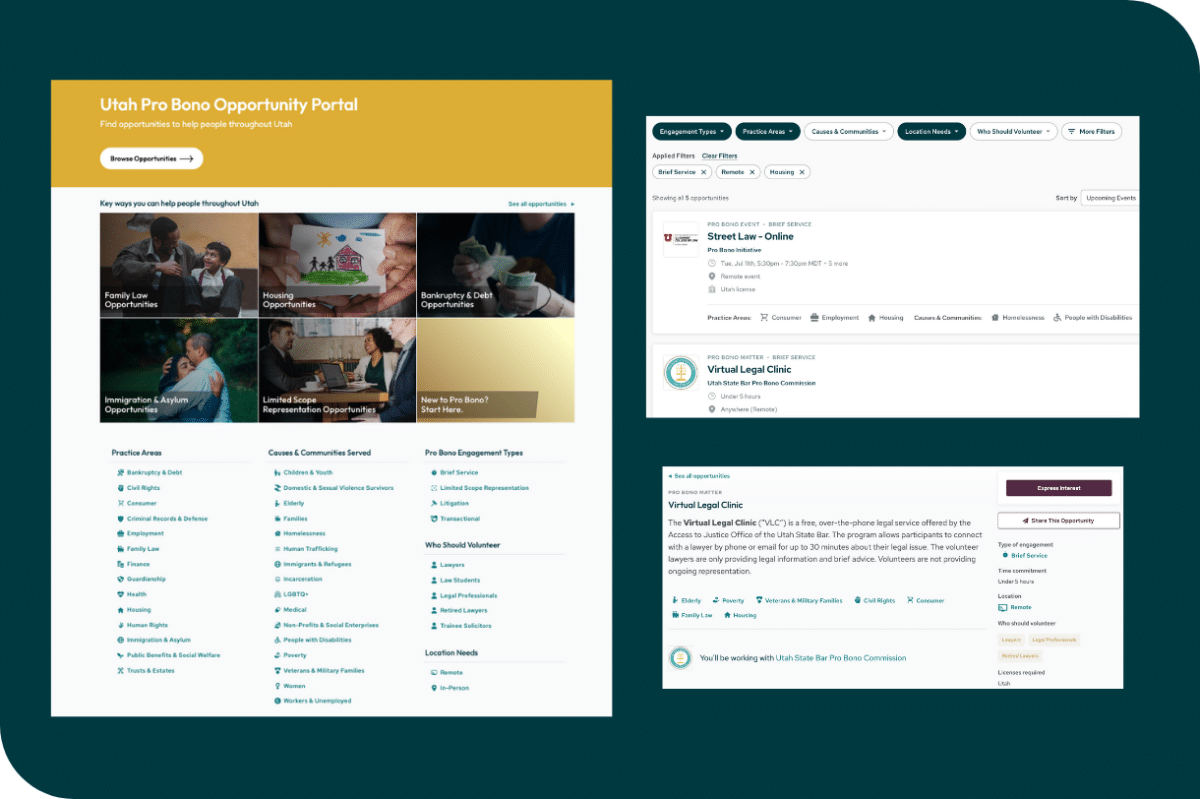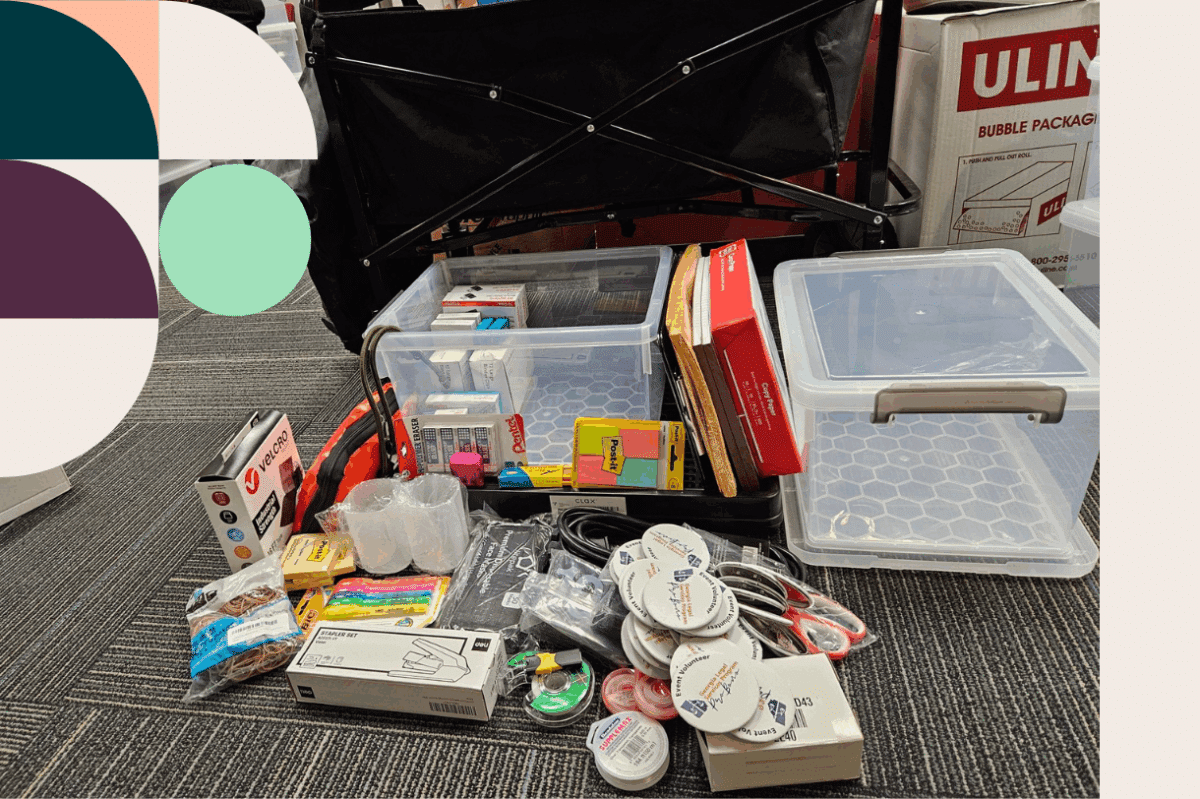In January 2023, the Utah State Bar Access to Justice Commission launched a Pro Bono Opportunity Portal, and hired their first-ever “Pro Bono Promoter.” This position was a new one to me, so I was excited to learn more. I talked with Pamela Beatse, Access to Justice Director at the Utah State Bar, and Kimberly Farnsworth, the Pro Bono Promoter and a 2024 J.D. candidate at BYU J. Reuben Clark Law School. From funding to hiring to successes and lessons learned, Pamela and Kimberly shared their insights for other organizations that may want to replicate this impactful model. It’s a stellar example of non-technological innovation in the access to justice space, and a lesson in how a small investment can have big returns. (Interview has been edited for clarity.)
How did you come up with the idea for this role, and what is a Pro Bono Promoter?
Pamela: I know what a difference it makes when you have someone who is focused on marketing, and someone who can think through important questions, such as: How do we get people interested? How do we get them engaged? How do we encourage them to take the step from curiosity to joining in? I wanted someone who was going to think outside the box and have that perspective.
I floated the idea to our Bar Foundation to see if there was any interest in funding a part-time, temporary position. I envisioned it as a one-year position, for the lead-up to launch and beginning stages of the pro bono portal. If you can get people using the portal, then it becomes routine. The Bar Foundation initially funded the position for six months. Now they’ve seen how fantastic Kimberly has been, and they’re funding it for the year.
How did you go about hiring for the role?
Pamela: I was looking for someone who was not only interested in the law, but also in innovation, as well as someone who was engaging and personable enough to make connections without being pushy. It’s finding a balance. Kimberly nudges people without coming across salesy. With law firms and legal services organizations, you have to be able to adjust and adapt to what comes at you, because they’re very different worlds. We were looking for someone who could work comfortably in both worlds and make a bridge.
We reached out to the law schools and we looked for people who were interested in access to justice, legal tech, and innovation. Kimberly is part of the legal tech club at BYU and that’s how she found out about the role.
Kimberly: I knew I wanted to work at the intersection of government and people trying to use government services. The access to justice space is where that’s happening; that’s where you’re learning how those interactions happen. [The Pro Bono Promoter position] has been very useful for learning about what’s actually happening on the ground and how to respond to those problems, as well as designing systems to solve problems.
How did you design the job description?
Pamela: I knew that I wanted whoever we hired to be a bridge between law firms and legal services organizations and be able to talk comfortably in both spaces. For the specifics, we’ve collaborated with Kimberly about what she is comfortable with and interested in doing. I didn’t want to throw her in and say, “This is what you have to do.” I don’t think that works well in this type of job. You have to feel confident. We’ve honed in on the types of things Kimberly does based on what she’s confident in, like presenting and speaking. Kimberly is really talented at telling a story and helping other people tell their stories, so we are using that strength.
Generally, someone in this role would be the go-to, first line of contact for legal services organizations. When the LSO has a question, or they are encountering a problem – they will know where to go. The promoter would also help LSOs understand the requirements for posting to the statewide portal – the organizations have to be providing free legal services to people of limited means – so they provide that guidance, and encourage LSOs to sign up. They explain how LSOs can gain a lot of intangibles from the portal, in addition to volunteers; there’s also branding and recognition, showing the public who you are as a program.
On the law firm side, it’s about encouraging use and helping them understand the portal as a one-stop shop: This is a way for lawyers to easily find pro bono opportunities that match their interests and time availability. We work with firm leadership to adopt that vision, too. There’s also awareness-building of the need for pro bono, and understanding the many types of legal issues that lawyers can help with through pro bono service.
Kimberly: We think about how to make positive associations with pro bono. Working with pro bono clients can be intimidating, and we want volunteers to have a good experience. Often with pro bono, the reward is that you’re helping people. But you need more than that – you also need to help attorneys feel comfortable engaging in pro bono. It’s important to find entry points for new volunteers.
Pamela: The other key piece of Kimberly’s role is to share the story we’re telling. Social media is important, using the Bar’s resources is important – such as the e-bulletin that goes to all the attorneys. We’re also publishing an article in the Bar Journal that explores all the ways the portal can help you to be a better lawyer and member of the community.
Can you share some successes you’ve had in these first six months?
Pamela: We presented at the State Bar convention, and demoed the portal with a presentation on pro bono. The message we wanted to convey was, “If I volunteer with the State Bar’s pro bono program, I’ll have support and guidance.” That presentation improved the image of pro bono in the state, and opened the door to go into more law firms and local bar associations. We did a CLE for 25 lawyers at a county bar association meeting, and 8 of them signed up to volunteer at the end.
On the LSO side, Kimberly has used the portal to pull in legal services organizations, help them understand everything the Bar offers, and find the best path for them to take advantage of those services.
Paladin really is an amazing tool, and the more people know about it, the better. That’s our ultimate goal – whether you’re a law firm, an attorney, or an LSO, we want you to know about the portal, and we want you to use it.
What advice would you give to other bar associations or organizations?
Kimberly: It took a few months to hit a stride. Give it some time to figure things out and let a person settle into the role.
I’m very much a perfectionist, and that was really holding me back. I kept doing things over and over and over again. But it’s more about just getting out there. Exposure is important; putting the information in front of people over and over. I want to make it as easy as possible for people to engage with our content. I can just keep putting things out there and eventually it will bear fruit. And be as quick as you possibly can. If someone reaches out, jump on that enthusiasm and momentum.
Pamela: Try the Pro Bono Promoter concept and see what it will do for you. It’s really easy to hold back and wait, but you don’t know what someone in this role can do until you try. You can always change course, but if you put in the time, it will pay off spectacularly. The buzz that Kimberly’s work with the Access to Justice Commission has built around pro bono is incredible. We’re hearing that the outreach makes a difference, that it’s engaged people in ways they’ve never been engaged from getting an email list. It opens up opportunities for you. I think if other states give this model a try, it will pay rich dividends for their pro bono efforts.




